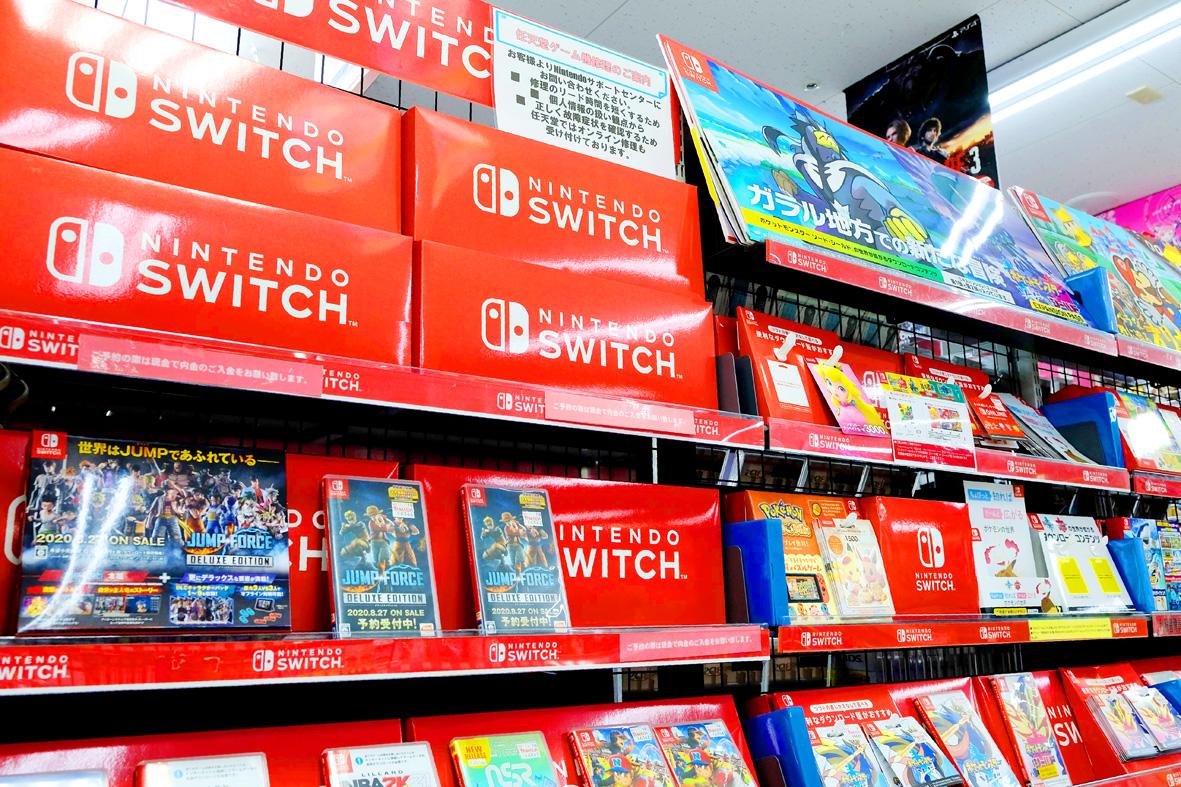Nintendo Co is raising its target for Switch production to about 25 million units this fiscal year, people familiar with the matter said, as the ongoing COVID-19 pandemic keeps lifting demand and component shortages ease.
The Kyoto, Japan-based company, which in April hiked orders to 22 million units by March next year, is asking partners to tack on another few million units, said the people, who did not want to be identified discussing internal goals.
Assembly partners plan to work at maximum capacity through December.

Photo: AFP
The new production target suggests that Nintendo is likely to outperform its Switch sales forecast of 19 million units for the current fiscal year, which analysts have either deemed conservative or blamed on possible COVID-19 supply shocks.
Plans could still change by adjusting output in the January-March quarter if demand begins to taper in the coming months, but production partners expect to at least surpass the 22 million units that they had previously been instructed to assemble, the people said.
A Nintendo spokesman declined to comment.
The company has been boosting Switch production since the start of this year, even before hit game Animal Crossing: New Horizons became the breakout success of the novel coronavirus era.
Its assembly partners, who also serve major smartphone makers, initially prioritized requests from more lucrative handset contracts, but find themselves with more capacity as orders level off due to the economic downturn, as well as the roiling US-China conflict.
The Switch remains hard to find in major markets, including the US and Japan, and Nintendo president Shuntaro Furukawa told shareholders in June that output should soon normalize.
Nintendo’s profit blew past all estimates after hit game Animal Crossing surged ahead during the pandemic, fueling global Switch sales.
The Japanese company reported a fivefold leap in operating profit to ¥145 billion (US$1.4 billion) in the quarter ended in June, smashing analysts’ average expectation of ¥63 billion.
That performance was driven by island life simulator Animal Crossing: New Horizons, which got off to a hot start in March with nearly 12 million copies sold in its first 11 days. The game sold another 10.6 million units in the latest quarter — about half of them via digital download — and is close to becoming the best-selling Switch title of all time.
Nintendo said that more than half of new Switch owners over the last three months played Animal Crossing first.
Nintendo said that while there is still a lag time in restocking store shelves, its production bottleneck for the Switch would soon be resolved.
Although Nintendo suffered some supply and shipping issues from the coronavirus outbreak, the company has mostly experienced a strong tailwind that has affected the entire games industry, as people spend more time at home to avoid spreading infection.
This trend is likely to last throughout the year, said Hideki Yasuda of Ace Research Institute, who anticipates accelerating sales of both hardware and software for Nintendo — especially the lucrative digital downloads — as the calendar moves toward the Christmas and New Year holiday shopping season.
On Wednesday, the company announced Pikmin 3 Deluxe for release at the end of October, partially addressing concern about its ability to sustain momentum through the holiday shopping period that is likely to be dominated by next-generation consoles and a slate of new titles from Microsoft Corp and Sony Corp.

Quanta Computer Inc (廣達) chairman Barry Lam (林百里) is expected to share his views about the artificial intelligence (AI) industry’s prospects during his speech at the company’s 37th anniversary ceremony, as AI servers have become a new growth engine for the equipment manufacturing service provider. Lam’s speech is much anticipated, as Quanta has risen as one of the world’s major AI server suppliers. The company reported a 30 percent year-on-year growth in consolidated revenue to NT$1.41 trillion (US$43.35 billion) last year, thanks to fast-growing demand for servers, especially those with AI capabilities. The company told investors in November last year that

Intel Corp has named Tasha Chuang (莊蓓瑜) to lead Intel Taiwan in a bid to reinforce relations between the company and its Taiwanese partners. The appointment of Chuang as general manager for Intel Taiwan takes effect on Thursday, the firm said in a statement yesterday. Chuang is to lead her team in Taiwan to pursue product development and sales growth in an effort to reinforce the company’s ties with its partners and clients, Intel said. Chuang was previously in charge of managing Intel’s ties with leading Taiwanese PC brand Asustek Computer Inc (華碩), which included helping Asustek strengthen its global businesses, the company

Taiwanese suppliers to Taiwan Semiconductor Manufacturing Co. (TSMC, 台積電) are expected to follow the contract chipmaker’s step to invest in the US, but their relocation may be seven to eight years away, Minister of Economic Affairs J.W. Kuo (郭智輝) said yesterday. When asked by opposition Chinese Nationalist Party (KMT) Legislator Niu Hsu-ting (牛煦庭) in the legislature about growing concerns that TSMC’s huge investments in the US will prompt its suppliers to follow suit, Kuo said based on the chipmaker’s current limited production volume, it is unlikely to lead its supply chain to go there for now. “Unless TSMC completes its planned six

TikTok abounds with viral videos accusing prestigious brands of secretly manufacturing luxury goods in China so they can be sold at cut prices. However, while these “revelations” are spurious, behind them lurks a well-oiled machine for selling counterfeit goods that is making the most of the confusion surrounding trade tariffs. Chinese content creators who portray themselves as workers or subcontractors in the luxury goods business claim that Beijing has lifted confidentiality clauses on local subcontractors as a way to respond to the huge hike in customs duties imposed on China by US President Donald Trump. They say this Chinese decision, of which Agence